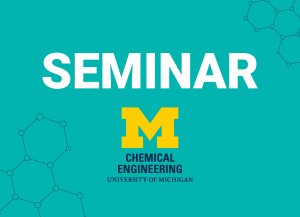Presented By: Chemical Engineering
ChE SEMINAR: Aditya Bhan, University of Minnesota
"Catalytic routes for upgrading C1 feedstocks… the hills molecules climb"

Abstract: C1 molecules, typified by abundant methane and carbon dioxide, are destined to serve as carbon sources for energy carriers and chemicals as we transition to a low-carbon future. We illustrate the kinetic and thermodynamic challenges in directing catalytic routes for the conversion of these critical feedstocks to products of higher value in the context of two case studies.
Strong, apolar C-H bonds in methane confer significant thermodynamic barriers for non-oxidative conversion of methane to aromatics. Medium pore MFI zeolites modified by well-dispersed carbidic molybdenum aggregates (MoCx/ZSM-5) reduce kinetic barriers to methane pyrolysis and catalyze dehydroaromatization (DHA) reactions with high benzene (≳ 70%) and aromatic (≳ 95%) selectivity at conversions near the ~10% equilibrium limit at ~950 K. We combine learnings from thermodynamics, reaction kinetics, and mass transport to clarify mechanistic observations and ascertain the identity of molecular events, species, and catalytic moieties that determine the activity of benchmark DHA catalysts. In doing so, we illustrate the significance of dispersive hydrogen transport at catalyst-bed length scales during DHA catalysis, and we leverage this understanding to develop polyfunctional catalytic formulations that alleviate thermodynamic constraints on maximum single-pass conversion in DHA catalysis.
We resolve persistent mechanistic questions regarding the selectivity to methanol and CO in competing CO2 hydrogenation pathways, the reaction intermediates involved, and the evolution in structure and function of commercial Cu/ZnO/Al2O3 catalyst using the general conceptual framework for analyzing rates and reversibility of catalytic reaction sequences. These kinetic analyses provide thermodynamic constraints precluding sequential reverse water gas shift and CO hydrogenation as the pathway for methanol generation, reveal hydrogen and water as species salient in determining methanol selectivity and yield by impacting both the forward and reverse rates of CO2 hydrogenation on Cu/ZnO/Al2O3, and illustrate that catalysis occurs on H- and HCOOH*-saturated surfaces where methanol synthesis proceeds through a formate pathway with rate-determining steps that are dependent on water partial pressures while RWGS proceeds through a carboxylate pathway with one rate-determining step.
Speaker Bio: Aditya Bhan received his Bachelor of Technology (B. Tech.) in Chemical Engineering from IIT Kanpur in 2000 and his PhD in Chemical Engineering from Purdue University in 2005. From January 2005 to August 2007, he was a postdoctoral scholar at the University of California at Berkeley and since then he has been on the Chemical Engineering and Materials Science faculty at the University of Minnesota where he currently serves as a Distinguished McKnight University Professor. He leads a research group focused on mechanistic characterization of catalysts useful in energy conversion and petrochemical synthesis. His group at the University of Minnesota has been recognized with the Paul H. Emmett Award in Fundamental Catalysis by the North American Catalysis Society, the Young Researcher Award from the Acid-Base Catalysis Society, the Ipatieff Prize from the American Chemical Society, and the NSF and DOE early career awards. He serves as Editor for Journal of Catalysis and has served as Chair of the ACS Catalysis Science & Technology Division.
Strong, apolar C-H bonds in methane confer significant thermodynamic barriers for non-oxidative conversion of methane to aromatics. Medium pore MFI zeolites modified by well-dispersed carbidic molybdenum aggregates (MoCx/ZSM-5) reduce kinetic barriers to methane pyrolysis and catalyze dehydroaromatization (DHA) reactions with high benzene (≳ 70%) and aromatic (≳ 95%) selectivity at conversions near the ~10% equilibrium limit at ~950 K. We combine learnings from thermodynamics, reaction kinetics, and mass transport to clarify mechanistic observations and ascertain the identity of molecular events, species, and catalytic moieties that determine the activity of benchmark DHA catalysts. In doing so, we illustrate the significance of dispersive hydrogen transport at catalyst-bed length scales during DHA catalysis, and we leverage this understanding to develop polyfunctional catalytic formulations that alleviate thermodynamic constraints on maximum single-pass conversion in DHA catalysis.
We resolve persistent mechanistic questions regarding the selectivity to methanol and CO in competing CO2 hydrogenation pathways, the reaction intermediates involved, and the evolution in structure and function of commercial Cu/ZnO/Al2O3 catalyst using the general conceptual framework for analyzing rates and reversibility of catalytic reaction sequences. These kinetic analyses provide thermodynamic constraints precluding sequential reverse water gas shift and CO hydrogenation as the pathway for methanol generation, reveal hydrogen and water as species salient in determining methanol selectivity and yield by impacting both the forward and reverse rates of CO2 hydrogenation on Cu/ZnO/Al2O3, and illustrate that catalysis occurs on H- and HCOOH*-saturated surfaces where methanol synthesis proceeds through a formate pathway with rate-determining steps that are dependent on water partial pressures while RWGS proceeds through a carboxylate pathway with one rate-determining step.
Speaker Bio: Aditya Bhan received his Bachelor of Technology (B. Tech.) in Chemical Engineering from IIT Kanpur in 2000 and his PhD in Chemical Engineering from Purdue University in 2005. From January 2005 to August 2007, he was a postdoctoral scholar at the University of California at Berkeley and since then he has been on the Chemical Engineering and Materials Science faculty at the University of Minnesota where he currently serves as a Distinguished McKnight University Professor. He leads a research group focused on mechanistic characterization of catalysts useful in energy conversion and petrochemical synthesis. His group at the University of Minnesota has been recognized with the Paul H. Emmett Award in Fundamental Catalysis by the North American Catalysis Society, the Young Researcher Award from the Acid-Base Catalysis Society, the Ipatieff Prize from the American Chemical Society, and the NSF and DOE early career awards. He serves as Editor for Journal of Catalysis and has served as Chair of the ACS Catalysis Science & Technology Division.